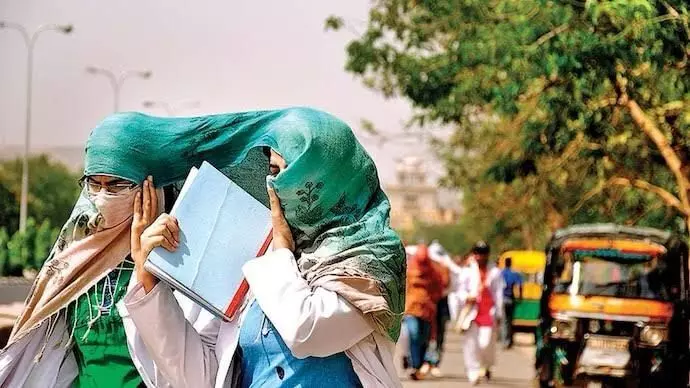Rising heat risks: Govt urges people to drink water, avoid peak sun hours
Travellers and citizens are advised to avoid exposure to direct sunlight during peak hours between 12 pm and 3 pm
By Newsmeter Network
Rising heat risks: Govt urges people to drink water, avoid peak sun hours
Hyderabad: As schools across India prepare for the summer break and families plan vacations, the Ministry of Health and Family Welfare has issued a detailed advisory to raise public awareness about the growing health risks from heat waves.
With several parts of the country already experiencing rising temperatures, health officials urge travellers and locals alike to take necessary precautions against heat-related illnesses.
Heat risk grows across the country
The India Meteorological Department (IMD) has forecasted above-normal temperatures in many regions for the summer of 2025. In anticipation, the National Centre for Disease Control (NCDC) has released updated health and clinical guidelines to help states, districts and health facilities prepare for extreme heat.
From March 15, patient-level data related to heatstroke and other heat-related illnesses is being tracked daily through the Integrated Health Information Platform (IHIP).
State health departments have been directed to ensure that medical professionals are trained in both reporting and clinical management using materials developed by the National Programme on Climate Change and Human Health (NPCCHH).
Guidelines for the public: What to do and avoid
Travellers and citizens are advised to avoid exposure to direct sunlight during peak hours between 12 pm and 3 pm. People should stay hydrated, wear light-coloured clothing and avoid consuming alcohol, caffeinated drinks or high-protein food during the day. Cooking should be done during cooler hours and in well-ventilated spaces.
Parents are reminded not to leave children or pets in parked vehicles, which can quickly reach dangerous temperatures. Those attending mass gatherings or outdoor events should be especially cautious, as heat exposure can be more severe in crowded environments.
Workplace and event safety measures
Employers have been advised to provide shaded areas, drinking water and regular rest breaks for workers, especially those in outdoor or physically demanding roles. New or returning workers should be gradually acclimatised to the heat, and training sessions should be held on recognising signs of heat stress.
For public events, especially sports and festivals, organisers are urged to ensure access to drinking water, shade and emergency medical support. Attendees should stay alert for early symptoms of heat stress such as dizziness, headache, nausea or decreased urination.
Health facilities on alert
Hospitals and clinics across the country are reviewing preparedness plans. This includes stocking essential medicines, intravenous fluids, ORS, ice packs and maintaining functional cooling systems. Fire safety audits are also being mandated.
The advisory encourages the use of sustainable solutions like solar panels, green roofs and rainwater harvesting to build long-term resilience against heat stress in public health infrastructure.
Community awareness and support
States are expected to run public information campaigns using local languages to spread awareness on how to prevent and respond to heat-related conditions. Templates for advisories and posters have been provided by NCDC for adaptation and local use.
As vacation season begins, individuals and families are urged to remain cautious. Heat-related illnesses are preventable, but timely action and awareness are key. In severe cases, such as heatstroke—marked by high body temperature, confusion, or unconsciousness—immediate medical attention should be sought by calling emergency services (Call 108/102).
For more information, visit: bit.ly/NCDCnewweb
Latest weather updates: mausam.imd.gov.in